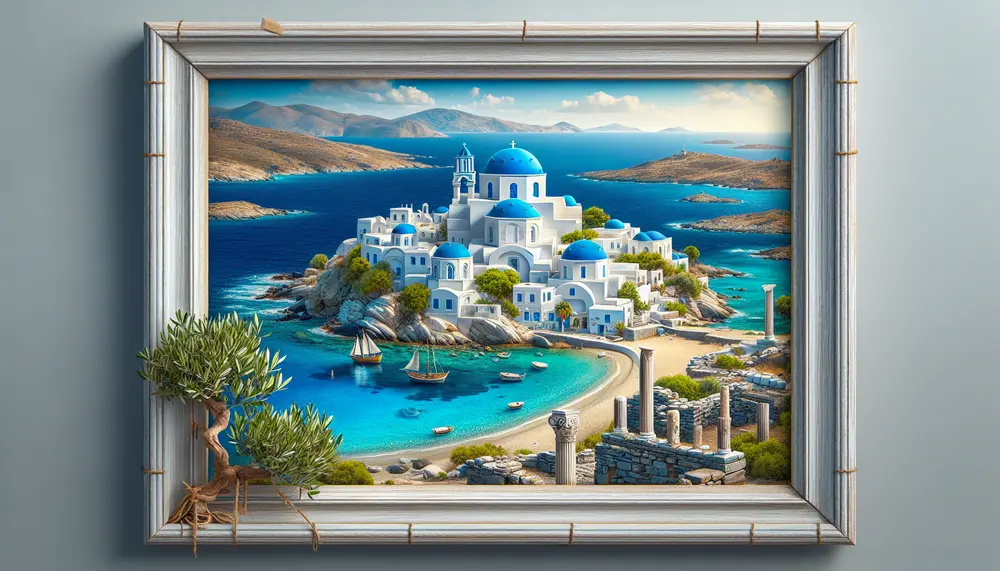Table of Contents:
Introduction to the Greek Isles' Cultural Richness
The Greek Isles are a treasure trove of cultural wealth, offering a unique blend of history, tradition, and natural beauty. Each island boasts its own distinct character, shaped by centuries of diverse influences. From the ancient ruins that whisper tales of the past to the vibrant traditions that color everyday life, the Greek Isles provide a captivating journey through time.
Visitors are often enchanted by the islands' ability to seamlessly blend the old with the new. Here, you can wander through timeworn streets where ancient architecture stands proudly alongside modern establishments. This harmonious coexistence of eras creates a dynamic cultural landscape that is both intriguing and educational.
Understanding the cultural richness of the Greek Isles begins with appreciating their historical significance. These islands have been the cradle of numerous civilizations, each leaving an indelible mark on the cultural tapestry. The Greek Isles are not just a destination; they are a living museum where history and tradition continue to thrive.
Exploring Ancient Ruins and Historical Sites
The Greek Isles are a haven for history enthusiasts, offering a plethora of ancient ruins and historical sites that transport visitors back in time. Each island tells its own story through its well-preserved relics, providing a glimpse into the lives of ancient civilizations.
One of the most iconic sites is the Palace of Knossos on Crete, a testament to the advanced Minoan civilization. Wandering through its labyrinthine corridors, visitors can imagine the grandeur of a bygone era. Similarly, the island of Delos, a UNESCO World Heritage site, is an archaeological wonder, offering insights into ancient Greek religious practices.
On the island of Rhodes, the medieval Old Town stands as a testament to the island's strategic importance throughout history. Its cobbled streets and imposing fortifications reveal the island's role as a crossroads of cultures and a stronghold of the Knights of St. John.
These historical sites are not just remnants of the past; they are active participants in the cultural narrative of the Greek Isles. Exploring them offers a profound understanding of the region's rich heritage and the enduring legacy of its ancient inhabitants.
Exploring the Cultural and Historical Significance of the Greek Isles
| Aspect | Pro | Con |
|---|---|---|
| Historical Sites | Rich in ancient ruins and historical landmarks that provide insight into past civilizations. | Some sites may be crowded with tourists during peak seasons. |
| Traditional Festivals | Offer a deep dive into local customs and provide unique cultural experiences. | May not align with all visitors' travel schedules. |
| Culinary Traditions | Delicious, authentic dishes using fresh, local ingredients. | Certain tastes or dietary preferences may not suit everyone's palate. |
| Mythological Influence | Rich storytelling embedded in local culture and sites adds depth to the travel experience. | The mythical context may not appeal to those uninterested in ancient stories. |
| Arts and Crafts | A wide variety of unique, handcrafted items serve as meaningful souvenirs. | Handcrafted goods may be more expensive than mass-produced alternatives. |
| Religious Traditions | Provide profound cultural insights through festivals and religious sites. | Some visitors may find religious customs unfamiliar or challenging to understand. |
Traditional Greek Festivals and Celebrations
The Greek Isles are renowned for their vibrant traditional festivals and celebrations, which offer a colorful insight into the local culture and community spirit. These events are deeply rooted in history and tradition, providing a unique opportunity for visitors to immerse themselves in the authentic Greek way of life.
One of the most celebrated festivals is the Panigiri, a lively event that takes place across many islands. These celebrations often honor patron saints and are marked by music, dance, and feasting. Visitors can join in the festivities, experiencing the warmth and hospitality of the local people.
Another significant celebration is the Apokries, the Greek Carnival, which occurs before Lent. This event is characterized by colorful parades, costumes, and a sense of joyous revelry. Each island adds its own unique twist to the celebration, making it a diverse and exciting experience.
These festivals are more than just events; they are a vital part of the islands' cultural identity. Participating in them allows visitors to connect with the traditions and customs that have been passed down through generations, creating memories that last a lifetime.
The Influence of Mythology on Greek Culture
Greek mythology is an integral part of the cultural fabric of the Greek Isles, influencing art, literature, and daily life. These ancient stories, filled with gods, heroes, and mythical creatures, continue to shape the identity and traditions of the islands.
The tales of Zeus, Athena, and Poseidon are not just stories of the past; they are woven into the very landscape of the isles. For instance, the island of Naxos is linked to the myth of Dionysus, the god of wine, and visitors can explore sites that celebrate this rich heritage.
Mythology also plays a significant role in local art and architecture. Temples and sculptures often depict scenes from these ancient tales, serving as a reminder of the enduring power of these narratives. The influence of mythology is evident in the way locals celebrate their history and express their creativity.
Through festivals, storytelling, and artistic expression, the myths of ancient Greece remain alive, offering visitors a deeper understanding of the cultural roots and spiritual beliefs that continue to inspire the Greek Isles today.
Culinary Traditions of the Greek Isles
The culinary traditions of the Greek Isles are a feast for the senses, offering a delightful blend of flavors and aromas that reflect the region's rich cultural heritage. Each island boasts its own unique dishes, crafted from fresh, local ingredients and time-honored recipes.
One of the most beloved aspects of Greek island cuisine is the emphasis on fresh seafood. From grilled octopus to succulent fish dishes, the bounty of the Aegean Sea is a staple in many island kitchens. These dishes are often seasoned with local herbs and olive oil, enhancing their natural flavors.
Traditional Greek meze—small plates of appetizers—are a highlight of any culinary journey through the isles. These include delicacies such as tzatziki, dolmades, and saganaki, offering a variety of tastes and textures to savor.
Islanders also take pride in their cheese-making traditions, with each island producing its own distinct varieties. From the tangy feta of Lesbos to the creamy myzithra of Crete, these cheeses are a testament to the islands' agricultural heritage.
Dining in the Greek Isles is not just about the food; it's a social experience that brings people together. Whether enjoying a leisurely meal at a seaside taverna or participating in a festive celebration, the culinary traditions of the Greek Isles offer a taste of the region's vibrant culture and hospitality.
Preserving and Experiencing Local Arts and Crafts
The Greek Isles are a vibrant hub for local arts and crafts, where traditional techniques are lovingly preserved and celebrated. These islands offer a unique opportunity to experience the rich artistic heritage that has been passed down through generations.
Artisans across the islands are dedicated to maintaining age-old crafts, from pottery and weaving to intricate jewelry making. Each piece tells a story, reflecting the cultural influences and natural beauty of the region. Visitors can often witness these skilled craftsmen at work, gaining insight into the meticulous processes involved.
Exploring local markets and workshops is a must for anyone interested in the arts. Here, you can find a variety of handcrafted items, each with its own unique charm. Whether it's a beautifully woven textile or a hand-painted ceramic, these crafts make for meaningful souvenirs that capture the essence of the Greek Isles.
Participating in workshops and classes is another way to engage with the local arts scene. Many islands offer opportunities for visitors to learn traditional techniques, providing a hands-on experience that deepens appreciation for the craftsmanship involved.
By supporting local artisans and embracing these cultural expressions, visitors contribute to the preservation of the islands' artistic legacy, ensuring that these treasured traditions continue to thrive for future generations.
The Impact of Religion on Greek Island Culture
Religion plays a significant role in shaping the culture of the Greek Isles, deeply influencing the social and cultural fabric of island life. The presence of numerous churches and monasteries across the islands is a testament to the enduring spiritual traditions that continue to thrive.
Orthodox Christianity is the predominant faith, and its impact is evident in the many religious festivals and rituals that are integral to island life. These events, such as Easter and the feast days of patron saints, are celebrated with great fervor and are central to community life. They offer visitors a chance to witness the profound devotion and communal spirit that characterize these celebrations.
The architecture of the islands is also heavily influenced by religious traditions. Iconic whitewashed churches with blue domes are a hallmark of the Cyclades, while the Byzantine-style monasteries of the Dodecanese showcase the region's rich religious heritage. These structures not only serve as places of worship but also as cultural landmarks that offer insight into the islands' history and beliefs.
Religion also influences local customs and daily practices, from the observance of fasting periods to the use of religious symbols in art and crafts. This spiritual dimension adds a layer of depth to the cultural experience of the Greek Isles, providing visitors with a richer understanding of the islands' identity and values.
Conclusion: Embracing the Timeless Heritage of Greek Isles
The Greek Isles offer a captivating journey through time, where the past and present coexist in a vibrant tapestry of culture and tradition. From ancient ruins to lively festivals, each aspect of island life is a testament to the enduring legacy of these remarkable lands.
Visitors are invited to embrace this timeless heritage, immersing themselves in the stories, flavors, and customs that define the Greek Isles. Whether exploring historical sites, participating in local celebrations, or savoring traditional cuisine, each experience provides a deeper connection to the islands' rich cultural identity.
By engaging with the local arts, crafts, and religious traditions, travelers not only gain insight into the unique character of each island but also contribute to the preservation of these cherished customs. The Greek Isles are more than just a destination; they are a living museum of history and tradition, inviting all who visit to become part of their ongoing story.
In embracing the cultural richness of the Greek Isles, visitors leave with a profound appreciation for the islands' heritage and a lasting memory of their enchanting beauty and spirit.
Unveiling the Cultural Treasures of the Greek Isles: Key Insights
What makes the Greek Isles culturally significant?
The Greek Isles are culturally significant due to their rich history, diverse influences, and the harmony of ancient and modern elements found throughout the islands.
Which historical sites should visitors explore in the Greek Isles?
Key historical sites include the Palace of Knossos on Crete, the archaeological site of Delos, and the medieval Old Town of Rhodes, each offering unique insights into the islands' past.
How do traditional festivals contribute to the cultural experience?
Traditional festivals like Panigiri and Apokries offer vibrant cultural experiences, allowing visitors to partake in local customs through music, dance, and celebratory feasting.
What role does mythology play in Greek island culture?
Mythology deeply influences Greek island culture by inspiring art, literature, and architecture, while myths of gods and heroes continue to shape the cultural identity of the islands.
How can visitors engage with local arts and crafts on the islands?
Visitors can explore local markets, observe artisans at work, and participate in workshops to learn traditional crafts, thus supporting the preservation of these cultural practices.



